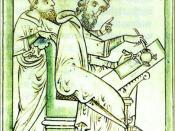Beauty, which is also good, can be seen in the image of our world everyday. It is this perception that can blind the ignorant into believing that this beauty is truth and thus remain simple, accepting and satisfied with them. They only see what appears to be beautiful in truth and from this they desire only pleasure and remain grounded here on Earth. Socrates in his reasoning and through the dialogue between him and Diotima in The Symposium concluded that love was not necessarily the need for our 'other half' but is directed towards beauty and goodness and to have those things we desire for forever. We strive for immortality by gazing upon the ultimate truth, which is beyond this world. Love is the love of beauty and goodness which can not be forsaken for it is the essence of human nature and the path to divine truth, sought only by the wise and disbelieved by the ignorant.
Plato, through Socrates in his utterance to Phaedrus, addressed the irrational actions of the lover, who was kept wholly ignorant in order for pleasure. The pains of love and the path this irrational madness led to was self-inflictions of the heart and mind. However, he recants this oration against the lover with whom he had so shamefully and in error describes. In fact Socrates, in this reading, goes so far as to conclude that "the madness of love is the greatest of heaven's blessings, and the proof shall be one that the wise will receive, and the ignorant disbelieve."
This madness described by Socrates, is believed to be divine and proper for the purpose of achieving ascension to the divine and is based on the premise that love is acknowledged as 'Eros' the son of Aphrodite and thus a...


